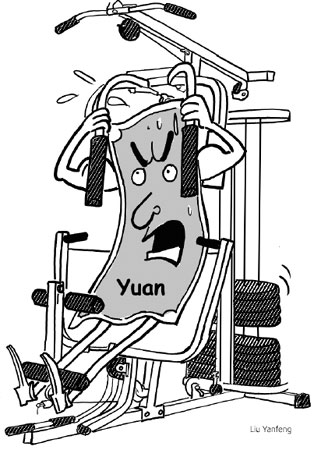Trouble with money as a reserve currency

A Thai friend asked me to say something about the possible rise of the yuan as an international reserve currency. The role of Asian currencies as global reserve currency is a subject that I have thought about almost throughout my career. When I was with the Hong Kong Monetary Authority, I thought a lot about whether the Hong Kong dollar could become an international reserve currency.
Then I asked myself, why didn't the yen, of the second strongest economy in the world, become a major reserve currency? Why did euro succeed and yen failed? This is a long story and not easily told in a short column. So I will tell the story in several parts.
First we have to go to basics. We have to understand what money is and why it is so important. An economist will tell you that money is a means of payment, a standard unit of measurement and a store of value. A priest will tell you that money is the root of all evils.
Everyone knows that money represents power, but money can also be a liability. You do not know the value of money until you try to borrow some, and then you realize who your friends are.

Actually, money is a derivative of the real economy - it is only the representation of real goods and services that you can buy with money. It is essentially a tool, which you can exchange to get other things. Like all tools, whether money is for good or evil depends on how you use it. If you have money, it is an asset for you, but it is also the liability of someone else. For example, the currency note you have in your wallet is the liability of the central bank.
Hence, money is an asset and a liability both. This dual property means money gives power, but it also comes with responsibility. In a country, the central bank is the only legal institution allowed to print money.
But money can be created if the state borrows it or credit is created by a country's commercial banks. If too much money is created in relation to the growth of real goods, you get inflation - too much money to buy too few goods. History has taught nations that the supply of money must be controlled. That is the function of the central bank.
Almost no one looks at the balance sheet of a central bank. For its liabilities, a central bank has the currency issue and deposits placed by commercial banks or the government. For its assets, a central bank has foreign exchange (liability of foreigners), government bonds (liability of government), central bank loans to banks and the private sector (liability of the private sector).
If we add up the balance sheet of a central bank and the commercial banks, we would realize that the liabilities are basically what we call broad money - the sum of currency notes issued and bank deposits. So money supply increases if a state borrows money or the country gets more foreign exchange or the commercial banks lend more credit to the private sector.
This basic lesson in money supply tells you the more credit there is in a system, the greater the supply of money would be. The greater the credit, the more people or the government would be willing to borrow to spend, which means that there are more jobs and more income. But we can spend too much, which is why credit must be controlled.
Once we understand that money is a derivative of the real economy, we appreciate why derivatives can be dangerous. The reason is the first derivative is tied to an underlying real asset, such as currency being backed by gold. But we can create a derivative on a derivative, which is a simple loan. A loan is a second order derivative of the net assets of the borrower. An asset-backed security is a third order derivative and a CDO (collateralized debt obligation) is fourth and CDO2 is fifth and so on. By the time you reach a swaption (swap on an option), you do not even know what are the underlying assets you are buying or selling. Derivation is through higher leverage and therefore complex and risky.
We all know that if the underlying assets get into trouble, the associated derivatives must get into trouble, too. So if the real economy is fragile, the financial system must be fragile. But because each level of derivative is in essence a higher level of credit (someone must trust someone else to create that credit), the collapse of credit can also damage the real sector. This is the case of the tail wagging the dog.
Why is this insight about money as a derivative important? A currency is only as strong as the real economy issuing the currency. Issuing money creates power over resources. A reserve currency can only function if foreigners widely accept the use of your currency. But if your economy is weak or fragile, being a reserve currency is not a blessing. Instead, it can be a curse.
The author is Adjunct Professor at Tsinghua University, Beijing, and University of Malaya.
(China Daily 08/06/2009 page9)














